

Robert Frost. Un article de Wikipédia, l'encyclopédie libre.
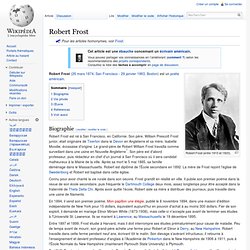
Pour les articles homonymes, voir Frost. Robert Frost (entre 1910 et 1920). Robert Frost (, San Francisco - , Boston) est un poète américain. Biographie[modifier | modifier le code] Connu pour avoir chanté la vie rurale dans son oeuvre, Frost grandit en réalité en ville. En 1894, il vend son premier poème, Mon papillon une élégie, publié le 8 novembre 1894, dans une maison d'édition indépendante de New York pour 15 dollars, équivalent aujourd'hui en pouvoir d'achat à au moins 300 dollars.
Entre 1897 et 1899, Frost étudie à Harvard, mais il doit interrompre ses études prématurément pour cause de maladie. En 1912, Frost part avec sa famille pour la Grande-Bretagne, il s'installe d'abord à Beaconsfield, une petite ville proche de Londres. Durant la Première Guerre mondiale, en 1915, Frost retourne aux Etats-Unis et achète une ferme à Franconia, dans le New Hampshire où il recommence à écrire. Vie privée[modifier | modifier le code]
Robert Frost. Robert Frost holds a unique and almost isolated position in American letters.
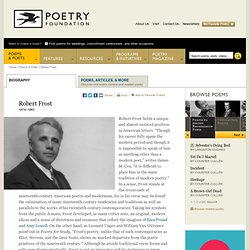
"Though his career fully spans the modern period and though it is impossible to speak of him as anything other than a modern poet," writes James M. Cox, "it is difficult to place him in the main tradition of modern poetry. " In a sense, Frost stands at the crossroads of nineteenth-century American poetry and modernism, for in his verse may be found the culmination of many nineteenth-century tendencies and traditions as well as parallels to the works of his twentieth-century contemporaries. Robert Frost. Going for Water. Reluctance. Love and a Question. Love and a Question A stranger came to the door at eve, And he spoke the bridegroom fair.
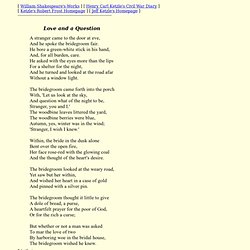
He bore a green-white stick in his hand, And, for all burden, care. He asked with the eyes more than the lips For a shelter for the night, And he turned and looked at the road afar Without a window light. The bridegroom came forth into the porch With, 'Let us look at the sky, And question what of the night to be, Stranger, you and I.' The woodbine leaves littered the yard, The woodbine berries were blue, Autumn, yes, winter was in the wind; 'Stranger, I wish I knew.' Within, the bride in the dusk alone Bent over the open fire, Her face rose-red with the glowing coal And the thought of the heart's desire. The Self-seeker. Acceptance. April 1936. Acquainted with the Night by Robert Frost. I have been one acquainted with the night.
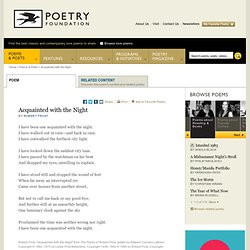
I have walked out in rain—and back in rain. I have outwalked the furthest city light. I have looked down the saddest city lane. I have passed by the watchman on his beat And dropped my eyes, unwilling to explain. I have stood still and stopped the sound of feet When far away an interrupted cry Came over houses from another street, But not to call me back or say good-bye; And further still at an unearthly height, One luminary clock against the sky Proclaimed the time was neither wrong nor right. Robert Frost, "Acquainted with the Night" from The Poetry of Robert Frost, edited by Edward Connery Lathem. Buy or borrow this book: Source: Twentieth-Century American Poetry (2004) Biography Robert Frost holds a unique and almost isolated position in American letters. Continue reading this biography. Robert Frost. Robert Lee Frost (March 26, 1874 – January 29, 1963) was an American poet.
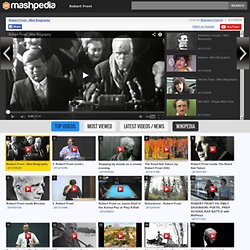
His work was initially published in England before it was published in America. He is highly regarded for his realistic depictions of rural life and his command of American colloquial speech.[2] His work frequently employed settings from rural life in New England in the early twentieth century, using them to examine complex social and philosophical themes. One of the most popular and critically respected American poets of the twentieth century,[3] Frost was honored frequently during his lifetime, receiving four Pulitzer Prizes for Poetry. He became one of America's rare "public literary figures, almost an artistic institution. " [3] He was awarded the Congressional Gold Medal in 1960 for his poetical works.
Videos.